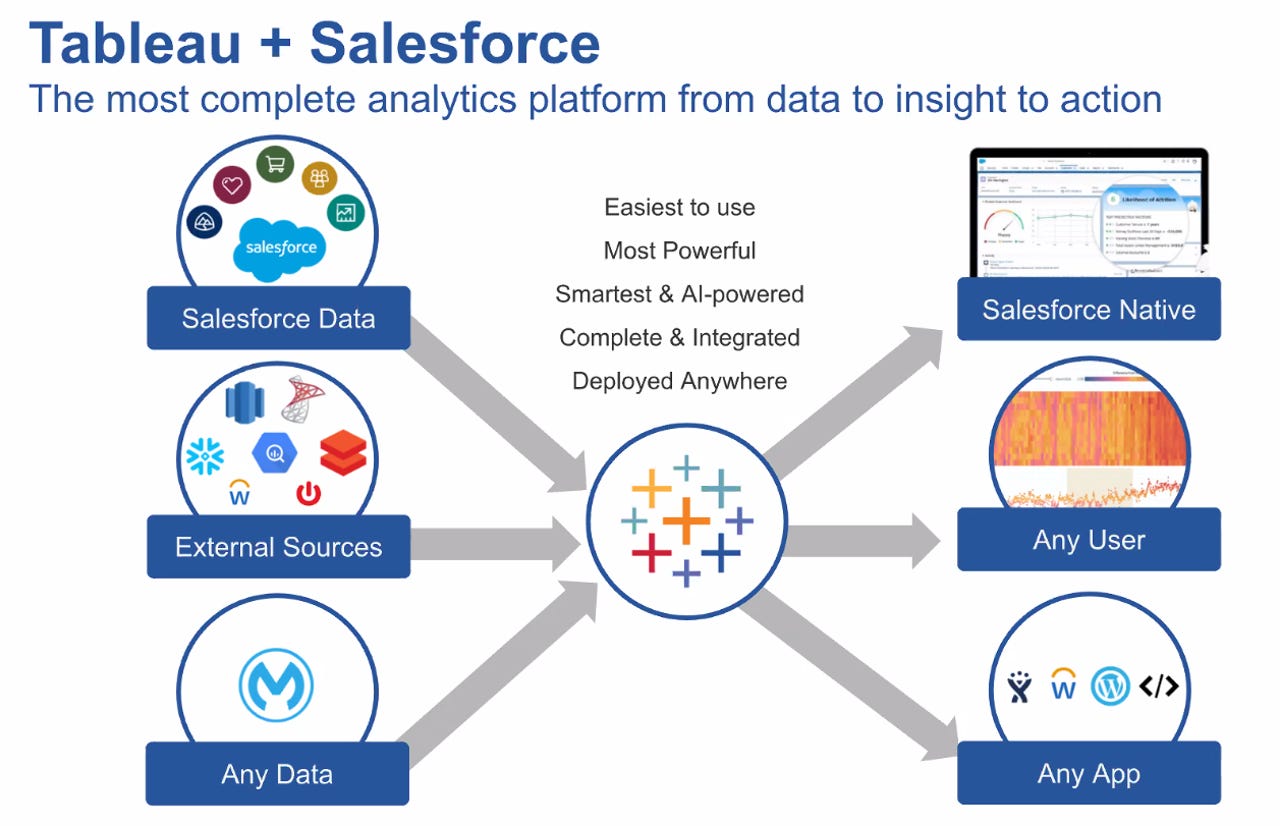Tableau integrates Einstein Analytics, becomes the analytics bridge in Salesforce ecosystem

Tableau is stepping up its efforts to integrate with parent Salesforce as its analytics software will build in Einstein Analytics, which will be renamed Tableau CRM.
Under the plan, Tableau CRM will provide an integrated analytics and AI experience within Salesforce's CRM workflow and be a key part of Salesforce Customer 360. The argument is that digital transformation is also a data transformation.
Tableau will be the analytics brand for Salesforce, with Tableau CRM being the new name of Einstein Analytics.
Salesforce acquired Tableau for $15.7 billion in June 2019. Since then, Salesforce CEO Marc Benioff has said that the analytics software provider was a key purchase that broadens the company's total addressable market. Salesforce said that revenue from platform and other in the second quarter was up 66% with Tableau contributing 41% of that growth.
Tableau's market is self-service analytics and broad use cases while Einstein Analytics is embedded natively within Salesforce CRM to deliver recommendations and predict outcomes. Adam Selipsky, CEO of Tableau, said the product teams from both sides came together earlier this year to combine roadmaps and create integrations.
Pricing is to be determined at launch.
"We're working together in an integrated fashion to make analytics more powerful," said Selipsky. "These capabilities will work more seamlessly together so we can innovate faster. The end of the day all that matters is that we can help customers. Salesforce is accelerating the Tableau mission."

Tableau's 2021 roadmap
At its annual conference, which is now virtual, Tableau highlighted Einstein Discovery in Tableau. The integration will launch in early 2021 and focus on enabling business users to discover patterns on their data without data models or data scientists.
Tableau said it will retain and build capabilities of Einstein Analytics and Tableau with plans to unify in the future.
The roadmap includes:
- Connecting Tableau natively to Einstein Analytics data store to optimize performance and security.
- Data preparation tools to read and write to both Tableau and Einstein Analytics to ensure clean data.
- Content portability to streamline dashboard creations.
Tableau Chief Product Officer Francois Ajenstat said the company's roadmap revolves around delivering analytics with any data anywhere and accelerating its product cadence. "We believe we have the broadest capabilities on the market," he said. "It's easy to get started and scale."
In 2021, Tableau plans to launch personal spaces, Slack notifications, AI and more machine learning tools. One key move will be delivering a Tableau native environment in browsers. For instance, Prep Builder this quarter will be available in the browser.
For Salesforce, the Tableau integrations mean it can better address data and analytics from multiple angles. "We will be able to add the prescriptive analytics capabilities across the Tableau platform," said Ajenstat.
Insights such as customer churn and telemetry will be available via bridges between Tableau and Einstein Analytics.
Visualization and calculations will be integrated too.
Tableau's reach with Salesforce
The combination of Tableau and Einstein Analytics is going to give the platform more prescriptive insights and recommendations across the data cycle.
"Tableau is this broad analytics platform. By bringing the two together we can expand the capabilities for customers," said Ajenstat.
Here's the architecture that Tableau will integrate in multiple stages with bridges first.
Over time, the capabilities will be one experience for exploration in data and consumption anywhere.
Indeed, Tableau's reach has surged during the COVID-19 pandemic:
- Tableau has more than 3.9 billion views of Tableau Public and more than 1 million public authors.
- The company's COVID-19 Data Hub has been used widely by governments, enterprises and researchers. Tableau will also be used to surface data and visualizations via the Equity Data Hub.
- "2020 demonstrated the power of data. The world has never relied on data more. Every big story was a data story," said Selipsky.
On Salesforce's second quarter earnings call, Benioff said:
We're so fortunate to be able to acquire Tableau last year. It is one of the world's leading enterprise software companies, probably one of the most loved brands. The ability to see and understand data, the ability to build these compelling visualizations like you see in the public domain like at public.tableau.com. But I think the parts that you don't really know are that when we talk to so many companies, they've gone wall-to-wall with Tableau. And doing those types of deals, that's very exciting because Tableau is analytics for the rest of us. We are always in the analytics business, of course, either through Sales Cloud. We've had dashboards and reports, which were great, but very much about kind of they exist, this reporting out of Sales Cloud, or we had Einstein Analytics, which is incredible, but it's super advanced AI, highly programmatic and very enterprise class.
Now that Tableau is part of Salesforce, they see how this has become part of our Customer 360.
Ajenstat said that Tableau will be connecting throughout Salesforce units to unlock data to broaden analytics and close the loop with company insights. If you play this out, Salesforce's plan with Tableau becomes clearer: Tableau will be the analytics glue throughout the Salesforce ecosystem with new use cases.
Selipsky said that Tableau's portfolio will continue to be an enterprise wide analytics platform, but Tableau CRM will represent integration with the Salesforce native environment.
The new portfolio will look like this for Tableau.